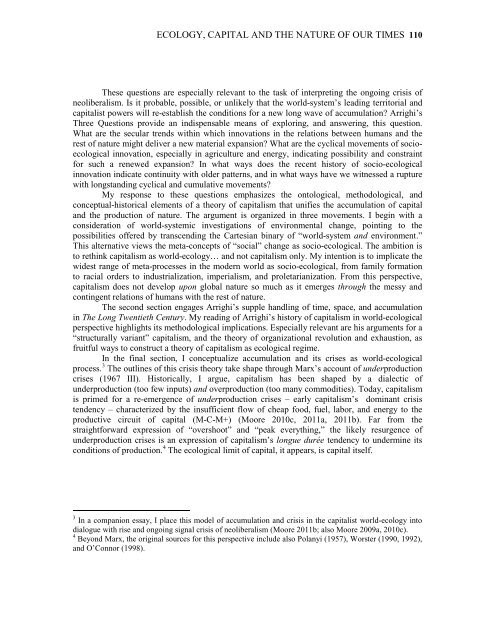Entire Volume 17 issue 1 - Journal of World-Systems Research ...
Entire Volume 17 issue 1 - Journal of World-Systems Research ...
Entire Volume 17 issue 1 - Journal of World-Systems Research ...
You also want an ePaper? Increase the reach of your titles
YUMPU automatically turns print PDFs into web optimized ePapers that Google loves.
ECOLOGY, CAPITAL AND THE NATURE OF OUR TIMES 110<br />
These questions are especially relevant to the task <strong>of</strong> interpreting the ongoing crisis <strong>of</strong><br />
neoliberalism. Is it probable, possible, or unlikely that the world-system’s leading territorial and<br />
capitalist powers will re-establish the conditions for a new long wave <strong>of</strong> accumulation? Arrighi’s<br />
Three Questions provide an indispensable means <strong>of</strong> exploring, and answering, this question.<br />
What are the secular trends within which innovations in the relations between humans and the<br />
rest <strong>of</strong> nature might deliver a new material expansion? What are the cyclical movements <strong>of</strong> socioecological<br />
innovation, especially in agriculture and energy, indicating possibility and constraint<br />
for such a renewed expansion? In what ways does the recent history <strong>of</strong> socio-ecological<br />
innovation indicate continuity with older patterns, and in what ways have we witnessed a rupture<br />
with longstanding cyclical and cumulative movements?<br />
My response to these questions emphasizes the ontological, methodological, and<br />
conceptual-historical elements <strong>of</strong> a theory <strong>of</strong> capitalism that unifies the accumulation <strong>of</strong> capital<br />
and the production <strong>of</strong> nature. The argument is organized in three movements. I begin with a<br />
consideration <strong>of</strong> world-systemic investigations <strong>of</strong> environmental change, pointing to the<br />
possibilities <strong>of</strong>fered by transcending the Cartesian binary <strong>of</strong> “world-system and environment.”<br />
This alternative views the meta-concepts <strong>of</strong> “social” change as socio-ecological. The ambition is<br />
to rethink capitalism as world-ecology… and not capitalism only. My intention is to implicate the<br />
widest range <strong>of</strong> meta-processes in the modern world as socio-ecological, from family formation<br />
to racial orders to industrialization, imperialism, and proletarianization. From this perspective,<br />
capitalism does not develop upon global nature so much as it emerges through the messy and<br />
contingent relations <strong>of</strong> humans with the rest <strong>of</strong> nature.<br />
The second section engages Arrighi’s supple handling <strong>of</strong> time, space, and accumulation<br />
in The Long Twentieth Century. My reading <strong>of</strong> Arrighi’s history <strong>of</strong> capitalism in world-ecological<br />
perspective highlights its methodological implications. Especially relevant are his arguments for a<br />
“structurally variant” capitalism, and the theory <strong>of</strong> organizational revolution and exhaustion, as<br />
fruitful ways to construct a theory <strong>of</strong> capitalism as ecological regime.<br />
In the final section, I conceptualize accumulation and its crises as world-ecological<br />
process. 3 The outlines <strong>of</strong> this crisis theory take shape through Marx’s account <strong>of</strong> underproduction<br />
crises (1967 III). Historically, I argue, capitalism has been shaped by a dialectic <strong>of</strong><br />
underproduction (too few inputs) and overproduction (too many commodities). Today, capitalism<br />
is primed for a re-emergence <strong>of</strong> underproduction crises – early capitalism’s dominant crisis<br />
tendency – characterized by the insufficient flow <strong>of</strong> cheap food, fuel, labor, and energy to the<br />
productive circuit <strong>of</strong> capital (M-C-M+) (Moore 2010c, 2011a, 2011b). Far from the<br />
straightforward expression <strong>of</strong> “overshoot” and “peak everything,” the likely resurgence <strong>of</strong><br />
underproduction crises is an expression <strong>of</strong> capitalism’s longue durée tendency to undermine its<br />
conditions <strong>of</strong> production. 4<br />
The ecological limit <strong>of</strong> capital, it appears, is capital itself.<br />
3<br />
In a companion essay, I place this model <strong>of</strong> accumulation and crisis in the capitalist world-ecology into<br />
dialogue with rise and ongoing signal crisis <strong>of</strong> neoliberalism (Moore 2011b; also Moore 2009a, 2010c).<br />
4<br />
Beyond Marx, the original sources for this perspective include also Polanyi (1957), Worster (1990, 1992),<br />
and O’Connor (1998).





